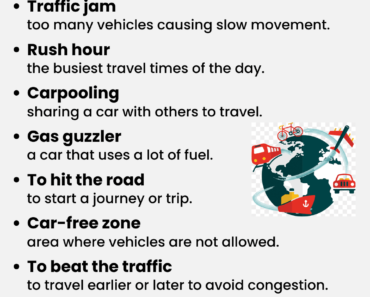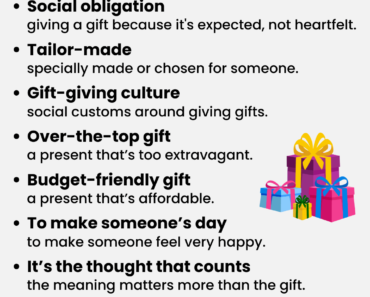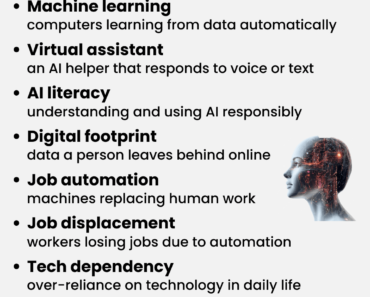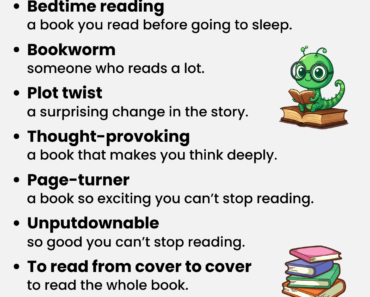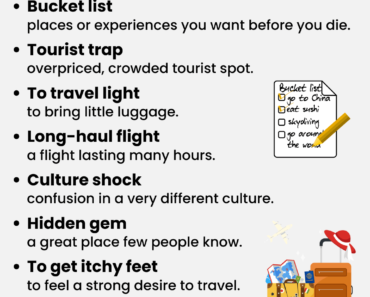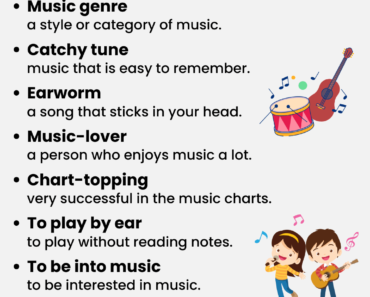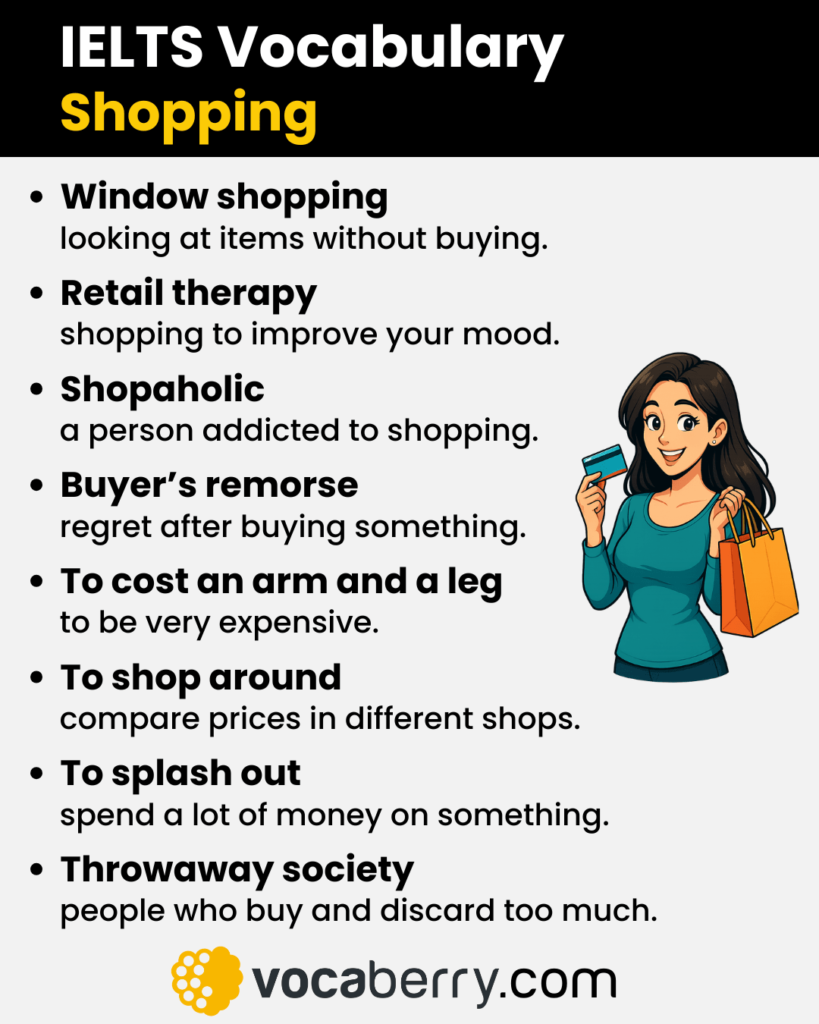
Shopping is another common topic in the IELTS Speaking test. Examiners may ask you about your shopping habits, favourite places to shop, or opinions on online and traditional shopping. In this guide, you’ll find useful IELTS vocabulary for shopping with clear definitions, followed by IELTS Speaking Part 1, Part 2, and Part 3 questions with sample answers.
IELTS Vocabulary for Shopping
Here is some useful IELTS vocabulary for talking about shopping with clear definitions. These words and phrases will help you give better answers in the IELTS Speaking test.
- Window shopping – looking at items without buying.
- Retail therapy – shopping to improve your mood.
- Shopping spree – buying a lot in a short time.
- Impulse buying – buying suddenly without planning.
- Bargain – something bought cheaply.
- Shoplifting – stealing from a shop.
- Bargain hunter – someone who looks for the best deals.
- Loyalty card – card giving rewards for repeat shopping.
- Brand loyalty – always buying the same brand.
- Luxury brand – expensive, high-status label.
- Second-hand / thrift shop – store selling used goods.
- Online shopping / e-commerce – buying through the internet.
- Add to cart – put items in an online basket.
- Cash on delivery – paying when the item arrives.
- Free shipping – no cost for delivery.
- Return policy – rules for sending products back.
- Customer service – help provided to buyers.
- Shopaholic – person addicted to shopping.
- Consumerism – the culture of buying and consuming goods.
- Overconsumption – buying more than necessary.
- Conspicuous consumption – buying to show off wealth.
- High street shops – traditional stores in town centres.
- Shopping mall / shopping centre – large complex with many stores.
- One-stop shop – a place where you can buy everything you need.
- Throwaway society – people who buy and discard too much.
- Boutique – small, stylish store.
- Checkout – place where you pay in a shop.
- Price tag – the cost written on an item.
- Overpriced – costing more than it’s worth.
- Counterfeit goods – fake branded products.
- Good value for money – worth the price.
- Customer reviews – opinions from buyers.
- Essential items – things you really need.
- Non-essential items – things bought for pleasure.
- Price comparison websites – online tools to check prices.
- At the click of a button – buy something online easily.
- Shop till you drop – shop until you’re exhausted.
- Buyer’s remorse – regret after buying something.
- Penny-pincher – someone who spends very little.
- On sale / on offer – available at a lower price.
- Knock-down price – very cheap price.
- Rip-off – something very overpriced.
- Top-notch – excellent quality.
- For a song – very cheaply.
- The real McCoy – genuine or authentic item.
- To sell out – when all stock is gone.
- To splash out – spend a lot of money on something.
- To tighten your belt – spend less money.
- To tighten one’s purse strings – to spend less money.
- To shop around – compare prices in different shops.
- To pay through the nose – pay much more than something is worth.
- To max out a credit card – to spend so much that you reach the card limit.
- To live beyond your means – spend more than you can afford.
- To pay over the odds – pay more than the usual price.
- To be on a tight budget – to have little money to spend.
- To keep up with the trends – to follow the latest fashions.
- To snap up a bargain – quickly grab a cheap deal.
- To hit the shops / stores – go shopping.
- To be spoilt for choice – have many options.
- To browse – to look casually without buying.
- To get a refund – money returned after returning a product.
- To queue up – stand in line while waiting to pay.
- To cost an arm and a leg – be very expensive.
IELTS Speaking: Shopping Questions & Answers
In this section, you’ll find IELTS Speaking Part 1, Part 2, and Part 3 questions on shopping with sample answers. These examples show how the shopping vocabulary can be used in your responses during the test.
IELTS Speaking Part 1 – Shopping
Do you enjoy shopping?
Yes, I do. I’m not a shopaholic, but a little retail therapy now and then is nice. Sometimes I just go window shopping without buying anything, especially when I’m not looking for essential items.
Where do you usually go shopping?
I normally go to high street shops or a shopping mall / shopping centre because it’s a real one-stop shop. I like to browse there and compare prices before I decide.
Do you prefer shopping online or in stores?
Both have advantages. With online shopping / e-commerce, I can check price comparison websites and buy at the click of a button after reading customer reviews. In stores, I can see the quality directly and go straight to the checkout.
Do you like buying things on sale?
Definitely. If something is on sale / on offer and it’s good value for money, I’ll try to snap up a bargain, especially at a knock-down price. I hate paying overpriced rates or getting a rip-off.
Have your shopping habits changed over the years?
Yes. I used to buy a lot of non-essential items and splash out, but now I focus more on essential items and stay on a tight budget. I’ve learned not to live beyond my means and sometimes I even tighten my belt for a few months.
IELTS Speaking Part 2 – Shopping Cue Card
Describe a memorable shopping experience you had.
You should say:
- when it was
- where you went
- what you bought
- and explain why it was memorable.
Sample Answer:
One of the most memorable shopping experiences I’ve had was during the New Year sales last January. I went to a huge shopping mall with a couple of friends, and the atmosphere was really lively. Almost every shop had items on sale, and you could see plenty of bargain hunters rushing around trying to grab the best deals.
At first, we did a bit of window shopping, just wandering around and checking out the displays. Then I spotted a jacket from a luxury brand that I’d wanted for ages. Normally, it would have cost an arm and a leg, but that day it was offered at a knock-down price. I didn’t hesitate and managed to snap up a bargain. The quality was amazing, and it definitely felt like the real McCoy rather than any kind of counterfeit goods.
What made the day even better was the overall experience. We compared prices in different shops to shop around before buying, and I even used my loyalty card to get an extra discount. Of course, I also gave in to a bit of retail therapy and bought some small things I probably didn’t need, a classic case of impulse buying. But honestly, it felt worth it because the deals offered such good value for money.
Looking back, it wasn’t just about the purchases. It was about enjoying the sales with my friends, feeling the excitement of finding great offers, and avoiding the risk of getting a rip-off. That’s why this shopping trip really stands out in my memory.
IELTS Speaking Part 3 – Shopping Discussion
IELTS Speaking Part 3 questions about shopping often ask you to compare online and traditional shops, discuss the influence of advertising and consumer culture, and give opinions on spending habits in society.
How has online shopping changed the way people buy things?
Online shopping has completely transformed buying habits. With just at the click of a button, people can add items to cart and often enjoy free shipping. It’s convenient and gives access to price comparison websites, which makes it easier to shop around. But it has also encouraged overconsumption, as people can make impulse purchases without really thinking.
Do you think people buy more than they really need nowadays?
Definitely. We live in a bit of a throwaway society, where people often buy non-essential items just because they’re on sale or on offer. Many shoppers are influenced by conspicuous consumption, wanting to show off luxury brands or top-notch products. While this boosts consumerism, it also leads to waste and financial stress for those who live beyond their means.
Why do you think some people enjoy shopping while others see it as a chore?
For some, shopping is a form of retail therapy; it’s enjoyable to browse, look for a bargain, or even go on a shopping spree. Others, however, may see it as tiring, especially when they have to queue up in busy shopping malls or deal with poor customer service. It really depends on whether someone views shopping as entertainment or just a practical necessity.
How do you think advertising influences shopping behavior?
Advertising plays a huge role. Promotions with knock-down prices, catchy slogans, or buy one get one free offers often tempt people into spending more. Some even end up with buyer’s remorse, regretting their purchases afterwards. Clever ads can make products look like the real McCoy or convince buyers they’re getting good value for money, even when it might be a rip-off.
Do you think traditional shops will disappear in the future?
Yes, I think traditional shops may disappear in the long run because online shopping is far more convenient. With e-commerce, people can compare prices on price comparison websites, enjoy free shipping, and shop at the click of a button. Many high street shops are already struggling as customers prefer one-stop shops online, where everything is available in one place. Unless physical stores reinvent themselves, they won’t be able to compete with the speed and variety of online options.
More IELTS Vocabulary Topics
If you found this lesson useful, explore other IELTS Speaking topics to expand your vocabulary and practice with sample answers:
- IELTS Vocabulary: Accommodation
- IELTS Vocabulary: Advertisement
- IELTS Vocabulary: Animals
- IELTS Vocabulary: Art
- IELTS Vocabulary: Artificial Intelligence
- IELTS Vocabulary: Books
- IELTS Vocabulary: Childhood
- IELTS Vocabulary: Crime and Punishment
- IELTS Vocabulary: Culture and Traditions
- IELTS Vocabulary: Daily Routine
- IELTS Vocabulary: Education
- IELTS Vocabulary: Environment
- IELTS Vocabulary: Family
- IELTS Vocabulary: Fashion and Clothes
- IELTS Vocabulary: Films
- IELTS Vocabulary: Food & Diet
- IELTS Vocabulary: Friends
- IELTS Vocabulary: Gifts
- IELTS Vocabulary: Health
- IELTS Vocabulary: Hobbies
- IELTS Vocabulary: Hometown
- IELTS Vocabulary: Money
- IELTS Vocabulary: Museums
- IELTS Vocabulary: Music
- IELTS Vocabulary: Plants
- IELTS Vocabulary: Social Media
- IELTS Vocabulary: Sports
- IELTS Vocabulary: Technology
- IELTS Vocabulary: Transport
- IELTS Vocabulary: Travel
- IELTS Vocabulary: Weather
- IELTS Vocabulary: Work & Jobs

